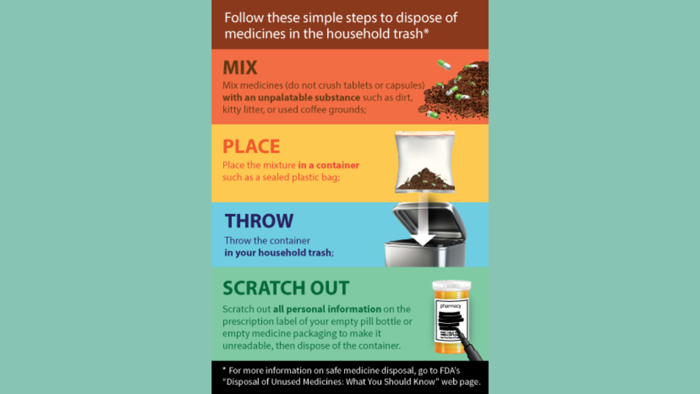What happens to expired medicines? Myths vs facts
Every house has a medicine box with expired medicines. We simply check the expiry date or expiry month of a medicine. But have you ever wondered what happens after a medicine crosses the expiry date: does it become counterproductive? Does it become ineffective? Or does it become poisonous?
Let's discuss expired medicines, and why it is important to check medicines before using them. We will also discuss a few myths around expired medicines to help you make correct judgment regarding medicines and their uses in the future.
How is the expiry date of a medicine decided?
The expiration date of medicines is determined through rigorous testing and regulatory oversight to ensure their safety, efficacy, and quality over a specified period.
Pharmaceutical manufacturers conduct extensive stability testing on their products to assess how they degrade over time under various storage conditions. This involves exposing medications to factors like temperature, humidity, light, and oxygen levels to mimic real-world scenarios. Through these studies, scientists monitor the chemical composition, potency, and physical characteristics of the medication to determine when it may no longer meet quality standards.
Regulatory agencies establish guidelines and standards for determining expiration dates. These agencies require pharmaceutical companies to submit stability data as part of the drug approval process. Based on this data, regulatory authorities evaluate the shelf life of medications and specify expiration dates that ensure their safety and effectiveness when stored and used according to labeled instructions.
Each batch or lot of medications undergoes quality control testing to verify its stability and adherence to regulatory standards before distribution. This batch testing helps ensure consistency and reliability in expiration dating across different manufacturing runs of the same medication.
What happens when you consume expired medicines?
Consuming expired medicines can potentially lead to several risks and consequences, although the severity and exact effects can vary depending on the specific medication and how long it has been expired. These medicines may have reduced potency and effectiveness. This can result in inadequate treatment of the medical condition for which the medication was prescribed. The chemical composition of medicines can change over time, leading to potential risks such as adverse reactions, allergic reactions, or unexpected side effects. This is particularly concerning for medications that degrade into harmful compounds or lose their therapeutic benefits.

In cases where expired medicines fail to treat a medical condition effectively, the underlying condition may worsen. This can lead to prolonged illness, delayed recovery, or complications that require additional medical intervention.
Expired medicines may also harbor microbial contamination or bacterial growth, especially if stored improperly. Consuming such medicines can pose risks of infections or other health hazards.
Which expired medicines are extremely harmful for the human body?
Several types of expired medicines can pose significant risks to health if consumed past their expiration dates. The level of harm can vary depending on the medication and its chemical stability over time. Here are some examples of expired medicines that are considered particularly harmful:
Expired antibiotics can lose their effectiveness in fighting bacterial infections. Taking ineffective antibiotics can lead to incomplete treatment of infections, allowing bacteria to develop resistance. This can result in prolonged illness, increased severity of infections, and the spread of antibiotic-resistant bacteria, posing public health risks.
Expired insulin and hormonal medications may lose potency, leading to improper management of conditions like diabetes or hormonal imbalances. Inaccurate dosing due to reduced potency can result in unstable blood sugar levels or other hormonal disruptions, potentially causing serious health complications.
Expired medications for heart conditions, such as nitroglycerin for angina or blood pressure medications, can be risky. Reduced effectiveness may lead to inadequate management of cardiovascular health, increasing the risk of heart attacks, strokes, or other cardiovascular events.
Expired epinephrine auto-injectors (used for severe allergic reactions like anaphylaxis) may lose potency and reliability. In emergency situations, ineffective epinephrine administration can delay or fail to provide life-saving relief, endangering the individual experiencing an allergic reaction.
Expired vaccines may lose their ability to provide protection against diseases. Administering expired vaccines can compromise immunity, leaving individuals susceptible to preventable infections or diseases.
Expired eye drops and ear drops may become contaminated over time, increasing the risk of infections or irritation to sensitive tissues. Improperly preserved drops can harbor bacteria or other pathogens, causing eye or ear infections that require medical treatment.
Expired chemotherapy medications can lose their effectiveness in targeting cancer cells. Ineffective chemotherapy treatment may allow cancer to progress or spread, compromising the patient's prognosis and treatment outcomes.
Are medicines still effective for some days after the expiration date?
While some medications may retain effectiveness for a short period after their expiration date, relying on expired medicines for treatment is not recommended. Studies have shown that expired medications can degrade over time, resulting in reduced potency and efficacy. Factors such as storage conditions (e.g., exposure to light, temperature, and humidity) can accelerate degradation, further compromising their therapeutic value. Healthcare providers advise patients to adhere to expiration dates and safely dispose of expired medications to ensure optimal treatment outcomes.

The potency and safety of medications can decline significantly after their expiration dates. Over time, chemical changes may occur within the medication, rendering it less effective in treating medical conditions. While expired medicines may not necessarily cause harm if used shortly after expiration, their reliability and therapeutic benefits diminish, leading healthcare providers to recommend discarding them properly and obtaining new prescriptions as needed.
Are expired herbal or natural supplements safer?
Herbal and natural supplements can also degrade over time and lose potency after their expiration dates. Like pharmaceutical medications, expired herbal supplements may not deliver the intended health benefits or therapeutic effects. Consumers are encouraged to follow expiration dates and proper storage guidelines for herbal products to ensure their efficacy and safety. Consulting with a healthcare provider or pharmacist can provide guidance on the proper use and disposal of expired herbal supplements.
Can storing medicines in the refrigerator keep them effective for more days?
Refrigeration may slow down the degradation of some medications but is not a reliable method to extend their shelf life indefinitely beyond the expiration date. Proper storage conditions, including temperature control and protection from light and moisture, can help maintain the potency and stability of medications before their expiration dates. However, refrigeration does not reverse the chemical changes that occur over time, and expired medications should still be disposed of properly to ensure safe and effective treatment outcomes.
Can expired medicines be recycled?
Recycling expired medicines along with regular household waste is not recommended. Pharmaceutical waste requires special handling and disposal methods to prevent environmental contamination and ensure public safety. Drug take-back programs, sponsored by pharmacies, healthcare facilities, or government agencies, offer safe and environmentally responsible disposal options for expired medications. These programs help prevent improper disposal, minimize environmental impact, and protect community health.
Is it safe to use expired medicines if they look and smell normal?
Visual appearance and odor are not reliable indicators of the safety or efficacy of expired medicines. While some medications may appear unchanged after their expiration dates, chemical degradation can occur without visible signs. Healthcare providers advise against using expired medicines based on sensory cues alone and recommend proper disposal to avoid potential risks and ensure patient safety.
Are expired ointments safe to use?
Using expired ointment can have several potential consequences due to changes in its composition and effectiveness over time. First, expired ointments may lose their potency and efficacy. Active ingredients, such as antibiotics or anti-inflammatory agents, can degrade beyond their expiration dates, rendering the ointment less effective in treating the intended condition. This can lead to inadequate relief of symptoms or failure to address the underlying issue for which the ointment was prescribed or recommended.
Moreover, expired ointments are at risk of microbial contamination. Over time, the preservatives in the ointment may lose their ability to inhibit bacterial or fungal growth. Applying contaminated ointments to wounds, burns, or skin lesions can introduce harmful microorganisms to the affected area, potentially causing infections. This risk is particularly concerning for individuals with compromised immune systems or those prone to skin sensitivities.
In addition to reduced effectiveness and microbial contamination, expired ointments may cause skin irritation or allergic reactions. Changes in inactive ingredients, such as emollients or stabilizers, can alter the texture and chemical composition of the ointment. These alterations may irritate the skin upon application, leading to redness, itching, burning sensation, or allergic dermatitis. Individuals with sensitive skin or pre-existing skin conditions may be particularly susceptible to adverse reactions from expired ointments.
Using expired ointments may undermine optimal medical treatment outcomes. Proper storage and disposal practices are essential to maintaining the integrity of ointments and minimizing potential health risks associated with their use beyond expiration dates. Consulting a healthcare professional for guidance on proper medication management and alternative treatment options is advisable if expired ointments are inadvertently used or if symptoms persist despite treatment.
What to do if expired medicine is taken?
If expired medicine is taken, it is important to assess the situation promptly and take appropriate steps to mitigate potential risks. First, remain calm and observe for any immediate adverse reactions or symptoms. While most expired medications may not cause serious harm immediately, their effectiveness could be compromised, leading to inadequate treatment of the medical condition.
Next, it is advisable to contact a healthcare professional or poison control center for guidance. Provide details such as the type of medication taken, its expiration date, and the amount consumed. Healthcare providers can offer specific advice based on the medication ingested and the individual's health status.
In some cases, if the expired medication is associated with a serious health condition or if there are concerns about potential adverse effects, seeking medical attention promptly is recommended. Healthcare professionals may evaluate symptoms, perform necessary tests, and provide appropriate treatment to manage any complications that may arise.
As a preventive measure, always check expiration dates before using medications and dispose of expired medicines properly to avoid accidental ingestion. Follow recommended guidelines for medication storage to maintain their potency and safety. Educating oneself and others about the importance of medication safety and adherence to expiration dates can help prevent incidents of expired medicine consumption and promote responsible medication management practices.
What to do with expired medicines?
Disposing of expired medicines safely is crucial to prevent accidental ingestion, misuse, and environmental contamination.
It's essential to check local guidelines and regulations regarding medication disposal. Many regions have specific instructions to ensure safe and environmentally friendly disposal practices. One of the most recommended methods is to use drug take-back programs. These programs are often organized by pharmacies, healthcare facilities, or local government agencies. They provide a convenient and secure way to return expired or unused medications for proper disposal. By participating in drug take-back programs, individuals can ensure that medications are disposed of by authorized personnel who follow approved methods, minimizing environmental impact and potential risks to public health.

In cases where drug take-back programs are not available, there are steps you can take for safe household disposal. Start by removing medications from their original containers and mixing them with an undesirable substance such as coffee grounds, kitty litter, or dirt. This makes the medication less appealing and reduces the risk of accidental ingestion. Ensure medications are in a sealed container or plastic bag to prevent leakage and place them in the household trash. It's crucial to remove or obscure any personal information on prescription labels to protect privacy.
It's important to note that flushing medications down the toilet or drain should generally be avoided unless specifically instructed to do so by disposal guidelines or medication labels. Flushing medications can contribute to water contamination and environmental harm.
For controlled substances like certain pain medications or sedatives, special disposal guidelines may apply due to their potential for abuse. Some pharmacies or law enforcement agencies provide take-back programs specifically for controlled substances to prevent misuse and ensure safe disposal.
If you have medications administered with needles or syringes (sharps), they require special handling. Use designated sharps containers available from pharmacies or healthcare providers to safely dispose of used needles and syringes. Do not place sharps directly into the household trash to prevent accidental needle-stick injuries.
Educating yourself and others about proper medication disposal practices is essential for protecting public health and the environment. By following these guidelines and utilizing available resources like drug take-back programs, you can contribute to safe medication management and environmental stewardship in your community.
